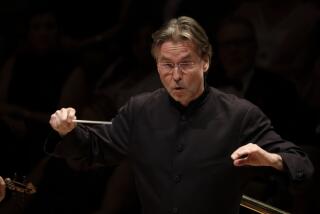A maestro at Disney Hall
It’s not hard to imagine music churning through the soul of Christoph Eschenbach -- the cosmopolitan conductor who’s considered one of the world’s great musical minds -- every waking hour. And then some, it turns out.
“I think we all, musicians, have some of those problems,” the German-born Eschenbach said with some amusement, “waking up in the middle of the night, hearing music and other things rotate in our minds.”
Eschenbach, 69, who served as the inspiration for Esa-Pekka Salonen’s composition “Insomnia,” was sitting in an office at Walt Disney Concert Hall, laughing at his own inability to stay asleep. His insomnia is not just frustrating but productive, he says, dressed in black and with dark, penetrating eyes and a bald pate. “I go to bed late anyway. It is also a great time, when no telephone rings, there is no noise to disturb you; it allows you to think in meditative ways.”
Southland audiences are the beneficiaries this month of the conductor’s intellectual and musical restlessness. Over the weekend he conducted a program of Tchaikovsky and Prokofiev, tonight he will play Franz Schubert’s final piano sonata in an evening that also includes Dvorák’s chamber music, and this weekend he’ll conduct Mozart and Bruckner. It’s an unusually long run that Deborah Borda, the philharmonic’s president and CEO, calls justified by his sophistication as a conductor and pianist.
“He is, simply, a consummate and deeply sensitive musician,” said Borda, who has worked with Eschenbach over four decades at various institutions. “He brings such a refinement to his work. And he’s also a very inquisitive mind, a great champion of new music.”
And though he’s recently been through one of the most talked-about breakups in classical music, in person Eschenbach seems no more angst-ridden than any other German intellectual.
Star-crossed union
Eschenbach first came to the attention of American audiences as a young pianist, admired by Leonard Bernstein and others, followed by an 11-year run as music director of the Houston Symphony.
But he’s probably better known for one of the worst musical marriages of recent times. He took over as musical director at the august Philadelphia Orchestra in 2003, at a time of rising player-conductor tensions around the country. He was hired against the wishes of much of the orchestra, who hadn’t played with him in almost five years and did not much warm to him: Upward of 70 players sent an open letter discouraging the hire.
The union was star-crossed from the beginning: Because he was otherwise engaged, he couldn’t even conduct the group’s opening night in its new Verizon Hall, which became notorious for its variable acoustics.
Some saw the marriage as a poor match of musical sensibility as well, since this enthusiast of contemporary music did not sync well with Philadelphia, considered perhaps the most traditional of the nation’s major orchestras.
Eschenbach concluded his stint in Philadelphia a year ago, and he’s toured with the group and continues to guest conduct. Still, he says that getting over sour feelings “wasn’t easy.”
He says he always had a comfortable relationship with the orchestra’s musicians. “That was not why I left,” he explains. “I left because of management -- mismanagement. It was always misunderstood in the press.”
These days, he’s empathetic about the Philadelphia musicians -- who belong to an organization that lacks a music director (Charles Dutoit is serving as a temporary artistic advisor) and several administrative posts. “They are at the moment without real management or even mismanagement. I hope the situation doesn’t do them harm.”
A divide
Of course, the reason people are interested in Eschenbach at all is the quality of his conducting: He’s known as an exemplar of rhythm done with great nuance and authority. But it’s also something that divides audiences and musicians. To admirers, his style is one of great rhythmic flexibility; to detractors, he’s fussy and impossible to keep up with.
Eschenbach thinks a complex sense of time comes out of the music itself and his need to set a phrase in perfect context.
“I want around the phrases there to be some space,” he says. “There should be some flexibility and liberty in speaking a phrase, saying a phrase, or playing a phrase. You don’t speak don-don-don-don, you form your sentences.”
He gets his sense of rhythm and structure not only from music but from other arts: He’s equally moved by the novels of Thomas Bernhard, Friedrich Hölderlin’s poetry, and Art Deco design.
While Eschenbach has also recently left a music conductor post at the Orchestre de Paris, he is preparing to take over as music director at the National Symphony Orchestra in Washington, D.C., in 2010.
At first blush, this has shades of Philadelphia all over again. The National Symphony Orchestra (which has performed at the Kennedy Center since 1986) and Eschenbach are not an obvious fit: The NSO and its audience are considered traditional, and the orchestra has been viewed as an underachiever.
His plans, he said with a gleam in his eye, are “to open it up.” He’s optimistic about the process. “It’s very important to have an open-minded administration,” he says, adding that the city is changing too. “It’s a wonderful atmosphere there, the new government, you kind of realize it in the air. We have an open-minded president, and he’s musical, and so is his wife.”
He’s already begun programming and plans that NSO’s first concert will pair Beethoven’s Ninth Symphony -- part of a cycle devoted to the composer -- with a piece by Matthias Pinscher, a German composer in his 30s. He plans to conduct pieces by Salonen and American composers.
Eschenbach has forged one of the most celebrated careers in the world, and he’s in demand everywhere. But for whatever musical or personal reasons, he has not, for a decade at least, found a comfortable home with an organization the way conductors -- whether Salonen in L.A., Herbert von Karajan in Berlin -- often do.
Eschenbach -- who spent last month in Germany and Scandinavia and next month in Italy, Britain, France and Austria -- isn’t daunted. “The place of home,” he says, pointing to his head, “is in me. I’m comfortable everywhere.”
Whether he ever settles down again, Eschenbach hopes to be conducting into his 100th year.
“In my 99th year I might find new aspects,” he said, smiling mischievously. “Not only in music, but in life.”
More to Read
The biggest entertainment stories
Get our big stories about Hollywood, film, television, music, arts, culture and more right in your inbox as soon as they publish.
You may occasionally receive promotional content from the Los Angeles Times.






